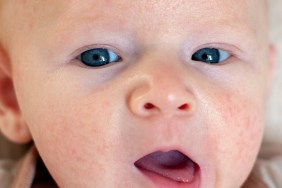Dealing with newborn diarrhea is stressful. However, knowing what to expect when infant diarrhea strikes, as well as when you should call your child’s pediatrician, can help you feel less powerless. Keep reading for everything you need to know about newborn diarrhea.
What’s the difference between newborn diarrhea and watery stools?
Babies generally have watery poop because they rely exclusively on breast milk or formula. Most bowel movements have the appearance of watery mustard mixed with cottage cheese. General changes in the color and texture of the movements are not in themselves indications of diarrhea. Instead, look for symptoms like a sudden change in the frequency and texture of your baby’s poop. If the poop is more watery, or almost pure liquid in texture, and more frequent than usual, it’s problably diarrhea.
What causes newborn diarrhea?
There are several ways your baby could have been inflicted with an newborn diarrhea. One of the most common factors is an allergy to milk. Nearly 3 percent of all babies are allergic to the proteins found in dairy products. Additionally, babies who have frequent contact with other children, at home or in day care facilities, have increased risks of developing an intestinal infection that is caused by parasites or viral infections on hands and toys. Although uncommon in newborns, antibiotics are another cause for diarrhea in infants as they often kill off healthy bacteria in the gut, causing stomach upset to develop.
How can you treat infant diarrhea?
It is crucial to keep your baby well-hydrated. Having diarrhea increases the risks of babies becoming dehydrated due to the amount of liquid that is leaving their body. It is important to continue giving breast milk or formula. Stay away from all sugary substances. Do not give babies sugary drinks, Jell-O, or even water. If you are worried about dehydration, consult with your doctor and see if a pediatric electrolyte solution is appropriate. Continue to change diapers regularly and apply extra diaper rash cream each time, since it’s extremely easy for babies to develop rash and irritation from frequent bowel movements.
When should you seek urgent care for infant diarrhea?
For diarrhea in infants, it is important to call your pediatrician right away if your baby is under 3 months of age. For babies over 3 months, call your doctor if diarrhea persists over a 24-hour period. Additionally, seek immediate medical attention if any of the following symptoms occur:
• A fever reaching 101 degrees Fahrenheit or higher in newborns and babies under 6-months-old
• A temperature of 103 degrees Fahrenheit or higher in babies over 6 months-months-old
• Bloody or black poop
• Signs of dehydration, including dry mouth, a sudden stop in wet diapers that lasts for six hours or more, and crying without any tears
Diarrhea in babies is unpleasant to deal with but not difficult to resolve.
Take a look at the most common questions about newborns that pediatricians hear all the time, with answers.
Photo: Getty








